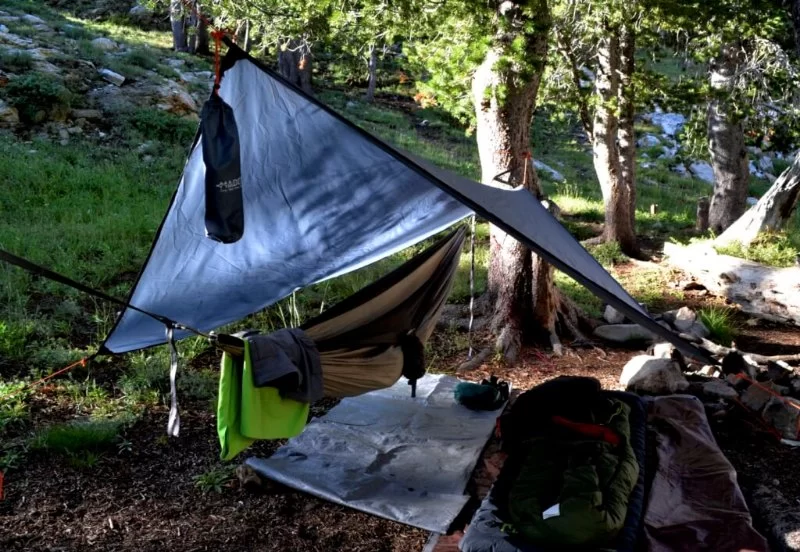Discover essential gear for desert backpacking with a hammock. Learn how to manage heat, water, and night comfort with expert tips and real-world desert camping stories.

- 1 - Understanding Desert Backpacking with Hammocks
- 2 - Choosing the Right Hammock for Desert Conditions
- 3 - Managing Heat and Sun Exposure in Harsh Environments
- 4 - Water Supply and Storage Strategies
- 5 - Sleeping Systems and Night Comfort
- 6 - Real-World Desert Camping Stories and Lessons
- 7 - Gear Combinations for Survival and Comfort
- 8 - Where to Find Specialized Desert Gear
1. Understanding Desert Backpacking with Hammocks
Exploring the desert with a hammock may sound unconventional, but it has become an increasingly popular choice among backpackers seeking lightweight alternatives to tents. Hammocks allow adventurers to avoid rocky ground and keep above desert critters. However, success depends on carrying essential gear for desert backpacking with a hammock, since desert environments pose unique challenges such as extreme heat, sparse shade, and sudden cold nights.
2. Choosing the Right Hammock for Desert Conditions
The desert demands durable, breathable fabrics that can withstand UV exposure and sand abrasion. A double-layer hammock provides both strength and flexibility for using sleeping pads underneath. Suspension systems also matter—adjustable straps are crucial since desert landscapes rarely offer perfect tree spacing, and sometimes only boulders or rock formations are available. Carrying a lightweight tarp is also essential, as it doubles as shade during the day and protection from dew or sudden desert showers at night.
3. Managing Heat and Sun Exposure in Harsh Environments
Desert backpacking is not just about enduring heat—it’s about managing it smartly. Wide-brimmed hats, reflective tarps, and lightweight UV-resistant clothing all help reduce fatigue. Hammocks set under tarps can create shaded resting zones that feel much cooler than the open ground. Some hikers even use reflective sunshades positioned strategically to redirect heat away from their setup. Proper sun management ensures energy conservation for longer hikes in dry conditions.
4. Water Supply and Storage Strategies
Water is the most critical factor when planning a desert trip. Carrying a hammock saves weight compared to a tent, allowing backpackers to allocate more pack space to water. Collapsible water containers, filtration devices, and electrolyte supplements are vital. A famous case in Arizona involved hikers who underestimated their water needs and relied on unreliable springs. Proper planning—sometimes as much as one gallon per person per day—is essential for safe and successful backpacking.
5. Sleeping Systems and Night Comfort
While days are hot, desert nights often plunge into surprisingly cold temperatures. To stay comfortable in a hammock, underquilts or insulated pads are necessary to prevent heat loss from below. A lightweight sleeping bag with moisture resistance works best in arid climates. Mosquito nets may not always be necessary, but they help protect against other desert insects. Many seasoned hammock campers suggest testing gear at home before taking it into desert conditions, where mistakes can be unforgiving.
6. Real-World Desert Camping Stories and Lessons
An online community story highlighted a group trekking through the Mojave Desert. While their tent-carrying companions struggled with uneven ground and high heat inside enclosed shelters, the hammock users enjoyed breezy, elevated sleep. However, one backpacker underestimated nighttime cold and had to improvise insulation from spare clothing. Stories like these emphasize the importance of preparation and the right mix of gear when backpacking in desert conditions.
7. Gear Combinations for Survival and Comfort
Essential desert hammock setups include reflective tarps, strong straps, and versatile insulation systems. Pairing these with hydration packs, multi-purpose survival gear, and compact stoves creates a balance between survival and comfort. Some adventurers recommend carrying lightweight trekking poles to rig hammocks where trees are absent, effectively turning rocks and poles into support anchors. This flexibility ensures that the hammock remains useful even in treeless desert landscapes.
8. Where to Find Specialized Desert Gear
The best gear for desert backpacking is not always found in standard camping stores. At Pine Cliff Resort, outdoor enthusiasts can explore carefully selected hammocks, hydration systems, and desert-ready accessories. Relying on trusted equipment ensures adventurers can focus on the beauty of desert landscapes rather than the discomfort of poor planning or inadequate gear.
Ultimately, backpacking in the desert with a hammock is not just about light travel—it’s about adapting to one of nature’s most extreme environments with the right preparation. With smart choices in gear, backpackers can transform the harsh desert into a place of comfort and adventure.
Bois D' Arc Camping Area
Grayson County, TX 75020, USA
Visit Location PageBalsam Site
Balsam, North Salem, NY 10560, USA
Visit Location Page